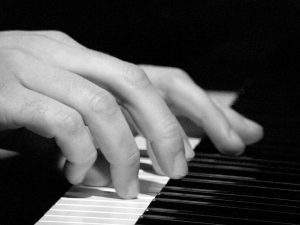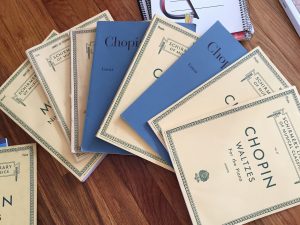Whether you’re a pianist, a singer, a flutist, or any other kind of musician, you should know how to practice. Want to improve your piano practicing? Here are some useful tips on how to improve your practicing so that you can continually become a better musician.
Tip 1: Don’t try to do everything right the first time.
You will never play or sing a piece perfectly the first time, and trying to is actually counterproductive. Instead, break each piece down. First, practice the notes. Do one measure at a time, then one line, then one section, until you can produce all the notes correctly. Then, one thing at a time, focus on the rhythms, the words, the dynamics, the tempo, the articulations, the style, etc. until it all comes together.

Tip 2: Focus.
If you don’t focus, you won’t learn. Concentrate. Don’t allow any distractions – no phone, no games, no pets, no little ones running around (if possible). An uninterrupted, focused practice session is a hundred times more productive than if you’re distracted, and you WILL learn your music faster and BETTER.
Tip 3: Organize your practice and set daily goals.
Whether you use a daily practice schedule or some other system, keep it organized. Set goals or objectives for each practice session and mark it down when you complete them. This will give you a sense of accomplishment and help you track your own progress.
Tip 4: Always start with warmups and exercises.
There’s a reason why I prefer to start every lesson with exercises, scales, or warmups. This puts your mind and body into music mode so that your muscles, fingers, voice, etc. are all in sync and ready to go. Your practice session will be better and far more productive if you warm up properly beforehand. I have my own set of warmups I do at the beginning of every practice session, and I cannot emphasize enough how important this is. It makes a WORLD of difference!
Tip 5: Slow down.
We all want to be perfect right away, but it’s just not going to happen. You should usually start working on a piece at a much slower and more careful tempo while you are learning the notes, fingerings, etc. When it is time to focus on the tempo, speed up GRADUALLY. If at any point you start making mistakes, slow down again until you no longer make mistakes. I have had students who can’t even see or hear their mistakes because they’re trying to play faster than their fingers and brain can comprehend. Don’t let this happen to you! It often leads to harmful habits and can be very difficult to undo. (Trust me…I have been on both sides of this equation. It’s always worth it to slow down.)
Tip 6: Don’t let mistakes slide.
Mistakes are costly and make your brain and hands or voice uncertain about what is correct. Letting a mistake slide will inevitably lead to more mistakes later on. If you make a mistake, go back and reproduce the same measure or section several times in a row without making a mistake before you move on again. Muscle memory is powerful and if your fingers or voice learn something incorrectly, you will lose a lot of time trying to undo the “wrong muscle memory.” If you find there’s a section where you often make mistakes, focus just on that section until you can reproduce it thirty, forty, fifty times without a mistake. This is the ONLY way to really iron out your mistakes during practice. Of course, if you’re burnt out and you’re making tons of mistakes all over the place, maybe it’s time to take a break. You’re probably going too fast or your brain is tired, and it’s better to come back later or the next day.
Tip 7: Give yourself a break.
Back in Tip 1, I said to break your pieces down. With that, don’t try to tackle everything in a single practice session (even if you’re breaking it down during that practice session). Give yourself a break. Maybe Day 1 you work on just the notes for the first two lines and that takes up most of your practice session. That’s fine! Come back to it the next day and build on it. Your mind needs a break so that it has a chance to absorb and process all the hard work you just put in. (This is why cramming for an exam never works…some people who cram may be able to spit out the correct information on the test, but within a few days, most of it has completely left the mind.)
Tip 8: Keep a regular practice time.
Set a schedule that works for you and always practice at that time. It’s best if you can schedule it around something else that is also a regular event, like a mealtime or work/school. If you know you always practice right before school or right after dinner, you’re more likely to remember to do it. This will also set your brain recognize 3pm (or whatever time you choose) as practice time, so when 3pm rolls around, you’re mentally ready to practice.
Tip 9: Learn to critique yourself.
Being able to critique your performance of your music is essential. I often ask my students how they feel after a performance, even when they’re just performing for me during our lessons. Are you really listening to yourself? Are you aware of your mistakes? Are you aware of your strengths? If you have a hard time critiquing yourself while you’re playing, consider video recording yourself and then studying it. You’ll see where you can improve, but you should also see where you are strong. Critical analysis should be both positive and negative and is essential to your growth.
Tip 10: Always end with something you love.
I will always give you music that will challenge you so that you can become a better musician. I know that means practicing can sometimes be difficult. Don’t let that frustrate you! Always end your practice session with something you love so that you walk away feeling good and empowered.
Contact me or talk to me at our next lesson if you would like more tips on how to improve your practice skills.



Pingback: 50 Life Lessons Learned in Piano Lessons | Musical Bri